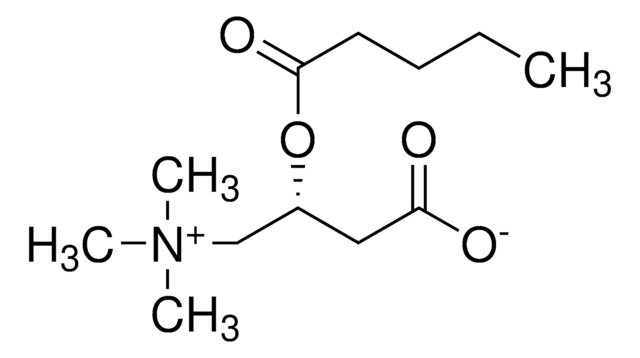39953
Lauroyl-L-carnitin
≥95.0% (HPLC)
Synonym(e):
(2R)-3-Carboxy-N,N,N-trimethyl-2-[(1-oxododecyl)-oxy]-1-propanaminium Inneres Salz, L-Carnitin-dodecanoylester, C12-Carnitine, Dodecanoyl-L-carnitin
About This Item
Empfohlene Produkte
Qualitätsniveau
Assay
≥95.0% (HPLC)
Form
powder or crystals
Optische Aktivität
[α]/D -20±2°, c = 1 in methanol
Verpackung
pkg of 10 mg
pkg of 50 mg
Verunreinigungen
≤10% water
Farbe
white to off-white
Funktionelle Gruppe
ester
Lagertemp.
2-8°C
SMILES String
C[N+](C)(C)C[C@H](OC(CCCCCCCCCCC)=O)CC([O-])=O
InChI
1S/C19H37NO4/c1-5-6-7-8-9-10-11-12-13-14-19(23)24-17(15-18(21)22)16-20(2,3)4/h17H,5-16H2,1-4H3/t17-/m1/s1
InChIKey
FUJLYHJROOYKRA-QGZVFWFLSA-N
Suchen Sie nach ähnlichen Produkten? Aufrufen Leitfaden zum Produktvergleich
Allgemeine Beschreibung
Anwendung
Biochem./physiol. Wirkung
Leistungsmerkmale und Vorteile
- Can be used in Metabolomics and Biochemical research
- High-quality compound suitable for multiple research applications
Sonstige Hinweise
Lagerklassenschlüssel
11 - Combustible Solids
WGK
WGK 3
Flammpunkt (°F)
Not applicable
Flammpunkt (°C)
Not applicable
Analysenzertifikate (COA)
Suchen Sie nach Analysenzertifikate (COA), indem Sie die Lot-/Chargennummer des Produkts eingeben. Lot- und Chargennummern sind auf dem Produktetikett hinter den Wörtern ‘Lot’ oder ‘Batch’ (Lot oder Charge) zu finden.
Besitzen Sie dieses Produkt bereits?
In der Dokumentenbibliothek finden Sie die Dokumentation zu den Produkten, die Sie kürzlich erworben haben.
Kunden haben sich ebenfalls angesehen
Unser Team von Wissenschaftlern verfügt über Erfahrung in allen Forschungsbereichen einschließlich Life Science, Materialwissenschaften, chemischer Synthese, Chromatographie, Analytik und vielen mehr..
Setzen Sie sich mit dem technischen Dienst in Verbindung.















